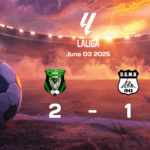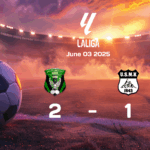Stéphane Sessegnon, the longtime captain of Benin’s national football team and the country’s all-time leading goal scorer, has formally announced his retirement from international football at the age of 40.
In an interview broadcast on national television in Benin, Sessegnon confirmed the end of a storied playing career that saw him earn legendary status among fans of the Cheetahs, formerly known as the Squirrels.
A fixture in the national setup for nearly two decades, Sessegnon represented his country with distinction and leaves behind a legacy unmatched in Beninese football history.
Now, the former Paris Saint-Germain and West Bromwich Albion midfielder is turning his focus to the next chapter of his professional journey: football management.
Speaking to 229foot in a follow-up interview, Sessegnon revealed his evolving ambitions beyond the pitch, explaining that although he initially leaned toward coaching, he has since discovered a deeper interest in a broader managerial role.
“At first, I wanted to be a coach,” he admitted. “But then I started to see things differently. I told myself that I preferred working in a way where I could advise and support younger players.
Bringing my experience to guide the next generation is something that resonates with me. I like the managerial approach, being there, providing perspective, helping shape careers.”
Nicknamed “Rotten Diego” during his playing days, Sessegnon’s passion for mentorship is rooted in his own journey through elite football.
His career spanned clubs in France, England, and Turkey with notable spells at PSG, Sunderland, and Montpellier, where he gained valuable insights into the inner workings of professional football at the highest levels.
When asked whether he has begun acquiring formal qualifications for a managerial role, Sessegnon confirmed that he is already taking steps in that direction. “Yes, it’s a gradual process,” he said. “I’m working on it slowly, step by step.”
While his immediate plans remain in development, the former Benin captain did not rule out collaborating with clubs he has previously represented. “Why not?” he responded when asked about a possible return to former teams in a management capacity. “The priority right now is completing the necessary qualifications. Once that’s done and everything is in place, we can think about working with those clubs again.”
Sessegnon’s transition reflects a growing trend among retired footballers choosing to remain in the sport through administrative, advisory, or developmental roles.
His preference for management over coaching underscores a desire to influence the game from a strategic and developmental standpoint rather than from the sidelines.
As Benin begins preparing for life after Sessegnon on the pitch, fans will be watching closely to see how the former captain’s next chapter unfolds off it.
Whether working behind the scenes or guiding the next wave of talent, Sessegnon’s presence in Beninese football is far from over.
With his retirement now official and a new path laid out before him, the former PSG playmaker seems determined to leave a second legacy, this time not through goals or assists, but through leadership, mentorship, and vision.












